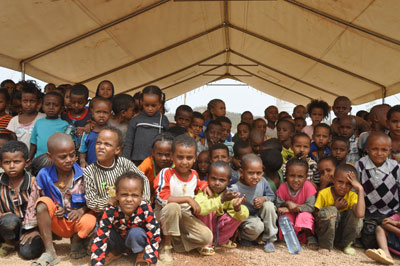Unfiltered Notes: Eritrea’s Second Chance

First, a true story for some perspective. From their school days, my brother remembers Jemil as a gentle fellow who stayed out of trouble. Then Jemil’s never-to-be-messed-with line was crossed when a popular Ethiopian general slapped him in a public place in Addis sometime in the mid-1990s. Jemil went out, came back with a gun and killed the abusive general on the spot.
Contrasting this with the indignities Eritreans have been experiencing under the very first regime of their own, it appears there is no limit to the suffering Eritreans are willing to endure. It started with the persecution of Jehova’s witnesses and we did nothing. Meeting no resistance, the regime kept upping the ante making persecution of other religions, disappearances, killings, confiscations and now, human trafficking part of Eritrean daily life.
There is even a joke that goes along with this reality, where Isaias asks God to give him another country to rule over because Eritreans are too docile and boring. “No matter how badly I treat them”, he tells God, “they refuse to fight back”. God denies the request telling him since there is no limit to your cruelty and no limit to how much your people are willing to suffer, you are perfect for each other. But don’t lose hope just yet – remember Forto 2013 or the 450 who busted out of thehell you created for them in Wia1
A Squandered First Chance
1991 was supposed to be a great beginning when wide-eyed optimism and contagious positive energy were abundant. Then, in what can only be described as delight in cruelty, a feudal system took over and reversed everything back to the Dark Ages. The big bright dreams are gone, consumed by the darkness we all helped create – literally, considering the frequency of power outages.
There is a long history of tegadelti — those we took to be among the most fearless and daring — getting slapped by the bully-in-chief or smashed by whiskey bottles and simply taking in the indignity with bowed heads. In some cases, the stories go, while they were armed. It is an image that is hard to reconcile. How is it the very one we were led to believe was ready to die to bring freedom to others, fails so badly to fight for his own? Worse, those so abused turn around to unleash their own cruelty on others. And unbecoming of their ‘courageous’ past, they only retaliate down — against people who did them no harm. According to Asmara’s hyper active rumor mill, even the acid-tongued Naizghi Kiflu took a bottle to the head but continued to do the dirty work for his abuser and went on to play a key role in the disappearance of his former comrades. But there is no honor or mercy in bully land and Naizghi probably got the worst of it – both when alive and dead. Which begs the question, whatever happened to Eritrean manhood?
Eritrean womanhood has not fared well either. The Eritrean mother used to be THE icon of fairness and compassion. Now the sharp tongue that used to lash out heavy doses of ‘mergem’ (curses) against bullies and those who broke social norms, is tamed to uttering cultish ululations.
There are exceptions of course, but too few to make THE needed difference because by the only measurement that matters, the bully is still in charge. And bit by bit, our first golden opportunity slipped away. While Ethiopia accepted reality and moved on – with a peaceful power transfer to boot – we remain stuck in the mud unwilling to move on. That is the unpleasant story of our first big chance. 22 years later, 1991’s optimism is a fading memory. But it can’t and shouldn’t end there. Now what?
The Second Big Reset
At long last, the voices demanding change are getting louder and stronger. Gone are the days when the regime’s propaganda was consumed so readily and thoughtlessly. It is good to see the regime’s inner circle crumbling. Who would have thought Ali Abdu, Eritrea’s liar-in-chief, would abandon the regime? In ‘screw the science’ bravado, he even told us his idol actually “breathed with his knees”. Then came Forto 2013. Now there are reports Negash Afwerki, Kisha’s deputy, may have also jumped ship. Who is next?
A second big reset (1991 being the first) is about to unfold and the day of reckoning will come, one hopes, sooner than later. However, the culture of banditry and lawlessness the regime has created won’t be easy to reverse quickly. So, what to do to make sure our second chance is not wasted like the first? No question there are better ideas but here are a couple that come to mind.
Start Breaking the Silos Now
Silos take away the advantage of leverage. Eventually, you end up getting isolated and weak, like Eritrea’s situation today. Call it the arrogance of success (1991) but we got blinded by our bombastic “uniqueness” and went out of our way to alienate everyone. Isaias had his tirades against the UN, OAU and African dictators (for being too soft, it now appears). I remember Girma Asmerom arrogantly stating how the world will soon see that we are different from other Africans (and it still makes me cringe today). And boy did we show them?
Unfortunately, we did so in ways we never imagined – by plunging Eritrea to the bottom of the heap.
And as we ran out of external enemies, we just as quickly invented internal ones. The silos multiplied. Religious and regional differences we thought we had overcome got reincarnated. Believing this group or that group is the new enemy, the number of opposition groups mushroomed – often incoherent and very antagonistic towards each other forgetting the pink elephant in the room, as they say. Finding no opportunities within, a large segment of the population – the segment that is more likely to demand and bring about change left and continues to leave. The sense of Eritrean-ness 1991 made possible has been seriously eroded and will have to be stitched back thread by thread.
We got too busy arguing which group or sub-group has it the worst – always debating which group’s cup is half full or half empty. And since all this is done in the isolation of our self-imprisoning silos, no one has bothered to join hands to fill the cup.
To break these silos, it is going to need very deep soul searching by everyone – at personal and organizational levels- to re-evaluate ALL previously held assumptions and belief systems. Some to discard and the good ones to double up on.
Nurturing an Inclusive Culture
The regime understand power very well. And since power concedes nothing, the regime also stops at nothing to maintain it. To that end, the regime’s culture of exclusion first gave us the tegadalai vs gebar (intentionally meant to be demeaning) divide. It was routine practice for gebars to be excluded from relevant work-related meetings in their own departments. Not surprisingly, trust between the two plummeted as intended. The divisive negative tone slowly expanded to other areas where, very often, people are declared non-Eritrean for views they hold that happen to be different than ours.
Some so-called deqbats, for example, say Isaias hates Eritrea because he is not Eritrean, which besides being false, is simply unproductive. He never was anything else. Even using the lowest standards of honesty, we know Hagos kisha lived his whole adult life as an Eritrean. For me, denying him that would be inhuman. Is his role negative? Yes, but how is that different from the equally destructive roles played by the likes of Alamin, Wuchu, wedi Gerahtu, Ali Abdu, Dr. Woldeab Isaac etc (we all know the list is too long). That is why the identity question is always a non-starter. It tries to solve a problem that doesn’t exist and shifts focus away from the real ones that must be addressed.
We also know many Ethiopians fought and died for Eritrea. They did more for Eritrea than many so-called Eritreans — especially the loud mouths who trumpet the identity card so callously. Here is Here is Haile Kugne’s example2 (goes well with long walks). Honoring them for their contributions, besides being the right thing to do, will also help deepen a much needed culture of inclusion. Haile tells his interrogator the only way he will be silenced from voicing his opinion is when he is dead. Strong character and strong ideals like Haile’s is what was missing and what we are going to need to make Eritrea’s second coming as successful as it can possibly be.
Maybe then, Eritrean children, like other children around the globe, will have the opportunity to unleash the power of their imagination by doing (this3). That is what is at stake with the second big reset – a new Eritrea at peace with itself and its neighbors, where no devil has the power to limit the future of a child or other citizens ever again.
Tewelde Stephanos
Email: testifanos@gmail.com
Links:
1http://www.youtube.com/watch?v=gqDGIj36kf8
2http://www.youtube.com/watch?v=yLogaEaGTSo
3 http://www.youtube.com/watch?v=dk60sYrU2RU



Awate Forum